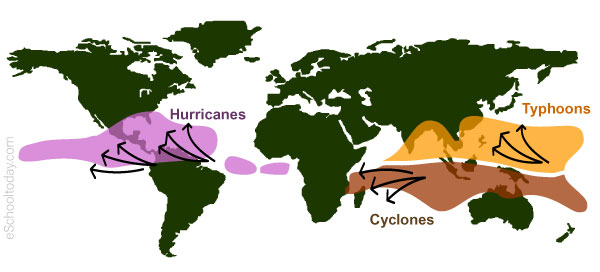- Hurricanes
Hurricane terminology
Hurricane season
It is the period in the year where tropical storms develop the most. It means the seasons are different from place to place. For example, seasons from the Atlantic may be different from seasons of the Pacific. The North Atlantic season is between June and November, peaking in August.
Typhoon
This is also a tropical storm, just like a hurricane. The difference is where they form. Typhoons form over the Indian or Western Pacific Oceans. See Map below:

Cyclone
It is a low-pressure system with gale-force winds that form over warm tropical waters. It is characterized by whirling, organized storms with sustained winds, just like hurricanes. Typically, they develop over the Indian ocean.
Cumulonimbus clouds
These clouds are formed mainly in warmer regions and over tropical waters. They result from the condensation of water vapor. These clouds are heavy in moisture and are associated with heavy rain, snow, hail, lightning storms, and even tornadoes.
Tropical Storm Watch or Hurricane watch
This watch is usually a series of information generally put together by the Weather Forecast Service for the people to know of a possible Storm. A watch notice means the storm is not imminent, but only a possibility. A watch is possible with modern computers, satellites, and advanced weather monitoring systems.
Tropical Storm Watch or Hurricane Warning
This is usually an official announcement made by the authorities, via TV, radio, text messages, e-mails, public announcement systems, or other means of an impending storm. A warning means the storm is very likely, and a threat to life and property. Emergency services take Warnings very seriously and prepare quickly before the storm hits.
Storm chasers
A storm chaser is a person who follows a storm as it moves from place to place. It is easy to think that it is madness to chase a storm, knowing how destructive it can be. But people follow storms (and other violent weathers) for many reasons, including curiosity, adventure, scientific research, exploration, or media coverage. Regardless of the motive, people must be educated to know what is involved, and not to put themselves in harm’s way.
Evacuation
Storm warnings usually come with orders instructing people to move away from the path of the impending storm. The quick, immediate, and often voluntary movement of people to safer places is known as evacuation. Sometimes emergency services assist with this and get people who are less able to help themselves to move. During an evacuation, there is the provision of water, food, and emergency supply, even though not all countries can do this.
